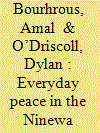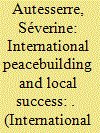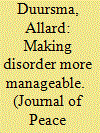|
|
|
Sort Order |
|
|
|
Items / Page
|
|
|
|
|
|
|
| Srl | Item |
| 1 |
ID:
193234


|
|
|
|
|
| Summary/Abstract |
Although the need for local ownership of peacebuilding is routinely emphasized, the importance and the modalities of engaging with local cultures and traditions are not adequately understood, and the peacebuilding potential of local customs remains largely unharnessed. Drawing on extensive interviews with community leaders (n94) and farmers and villagers (n107), and using a conceptual framework that combines notions of the everyday and events that mark a rupture with the everyday, this article explores the opportunities that local people’s everyday interactions, culture, and traditions offer for peacebuilding in post-Islamic State Ninewa Plains, Iraq. In doing so, the article makes a theoretical contribution to the everyday peace literature by further developing existing typologies of everyday acts and attitudes of everyday peace. Demonstrating how everyday acts and attitudes of peace sit on a scale with negative peace on the one end and positive peace on the other, the article introduces the concept of ‘affinity’ on the positive peace side of the scale, to refer to an affective engagement with the other and to acts of getting to know, understand, and participate in what is important to the other community.
|
|
|
|
|
|
|
|
|
|
|
|
|
|
|
|
| 2 |
ID:
152816


|
|
|
|
|
| Summary/Abstract |
Existing research on war and peace lacks analysis of what allows peacebuilding to succeed at the subnational level. Instead, most scholars focus on peacebuilding failure and macro-level dynamics. This is unfortunate because the obstacles to peacebuilding are such that the most puzzling question is why international efforts sometimes succeed, rather than why they fail. The lack of focus on success is also problematic because it results in ambiguous findings. On the one hand, there is an emerging consensus that local conflict resolution is crucial to building peace. There is also an agreement that, all else being equal, international support tends to increase the chances of successful peacebuilding. On the other hand, when international actors have tried to back local initiatives, they have often generated counterproductive consequences and worsened the situation. Should international actors support local peacebuilding processes? If so, how can they actually do this?
|
|
|
|
|
|
|
|
|
|
|
|
|
|
|
|
| 3 |
ID:
178731


|
|
|
|
|
| Summary/Abstract |
Much of the quantitative conflict resolution literature focuses on mediation between states or on efforts to end a civil war through a comprehensive peace agreement that brings peace to the entire country. This article instead analyses the effectiveness of mediation between a wide range of armed actors on a subnational level. Utilizing unique data on Darfur covering the January 2008–August 2009 period, this article finds that mediation efforts following armed clashes in a given area significantly prolong local lulls in fighting in this area. This finding remains robust when controlling for the presence of a peacekeeping base, battle-deaths and the type of armed actors engaged in armed clashes. In addition, the finding remains robust when accounting for the non-random assignment of mediation efforts through matching similar observations in the dataset. Finally, anecdotal evidence from sites of armed conflict beyond Darfur suggest that the findings from this study might also hold in other armed conflicts.
|
|
|
|
|
|
|
|
|
|
|
|
|
|
|
|
|
|
|
|
|